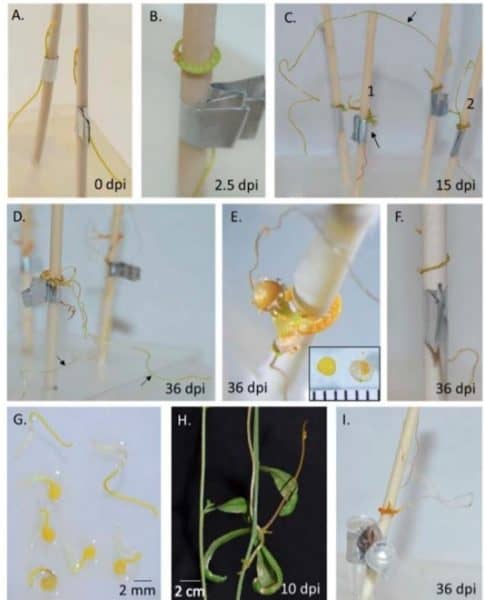IPPS Online Seminar Series July 07, 2021 at 3:00 PM GMT (8:00 AM Los Angeles, 10:00 AM Bogota/Brasilia, 11:00 AM New York/Santiago, 4:00 PM Abuja/London, 5:00 PM Amsterdam/Berlin/Cape Town, 6:00 PM Nairobi/Tel Aviv, 11:00 PM Beijing, 12:00 AM Tokio, 01:00 AM (next day) Canberra)
Cuscuta campestris is an obligate parasitic plant that requires a host to complete its lifecycle. Parasite-host connections occur via an haustorium, a unique organ that acts as a bridge for the uptake of water, nutrients and macromolecules. Research on Cuscuta is often complicated by host influences, but comparable systems for growing the parasite in the absence of a host do not exist. We developed an axenic method to grow C. campestris on an Artificial Host System (AHS). We evaluated the effects of nutrients and phytohormones on parasite haustoria development and growth. Haustorium morphology and gene expression were characterized. The AHS consists of an inert, fibrous stick that mimics a host stem, wicking water and nutrients to the parasite. It enables C. campestris to exhibit a parasitic habit and develop through all stages of its lifecycle, including production of new shoots and viable seeds. Phytohormones NAA and BA affect haustoria morphology, and increase parasite fresh weight and biomass. Gene expression in AHS haustoria reflect process similar to those in haustoria on actual host plants. The AHS is a methodological improvement for studying Cuscuta biology by avoiding specific host effects on parasite and giving researchers full control of the parasite environment.
Vivian Bernal-Galeano is a Colombian biologist, who is passionate about plant-parasites and plant-microbe interactions, as well as the impacts of science on society. She received her BS. in biology at Universidad Nacional de Colombia, and her MSc. in Microbiology at Universidad de los Andes in Bogota. She is currently finishing her PhD in the Westwood Lab in the School of Plant and Environmental Sciences at Virginia Tech, USA. Her research involves the development of tools to study the biology of the plant parasite Cuscuta campestris and the relationship between this parasitic plant and its host. She has also investigated the economic benefits of potato diversity conserved in Genebanks.
